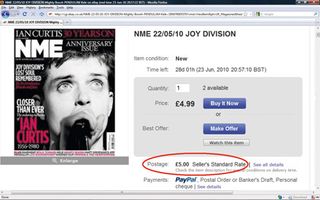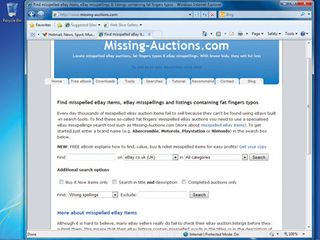Online auction sites can be a hotbed of scams because each transaction relies on trust. "Many people say that following the herd is a bad thing, but the herd is a way of establishing a reputation of trust," says economist Dr Baines.
"Ebay was very successful because it allowed you to rate sellers. Amazon went down the route of rating products as well as sellers, but all of these sites work on the basis of the person's reputation." Trusting the herd to rate goods and sellers works, but there are several scams that savvy bargain hunters need to be aware of before they part with their cash.
1. Account hijack
Your 100 per cent positive trading reputation is worth money, and scammers want you to part with your password so that they can log in, change it and lock you out. While you try to convince the auction site's owners that you're the real owner, the scammer trades on your reputation by creating new listings for non-existent goods.
Scammers will use a phishing attack to pinch your details. To stay safe, remember that no reputable auction house will ever send you an email asking you to log in and verify your identity by following a link. Always log in directly.
2. Wire and escrow scams
Always use the site's built-in payment system. If a trader insists that you use a wire transfer system instead of PayPal, refuse. Wire transfer services aren't protected from fraud and you may never see your money again. The money wire scam usually involves something expensive (cameras are popular) being offered well under market value.
Get the best Black Friday deals direct to your inbox, plus news, reviews, and more.
Sign up to be the first to know about unmissable Black Friday deals on top tech, plus get all your favorite TechRadar content.
You win the auction and send the cash, but the transaction is refused. The seller emails to say that there's a problem with his PayPal account and asks if you can transfer the money using another, unprotected method. You send the money and the seller vanishes.
A related scam is the fake escrow. An escrow is a trusted third party who holds the buyer's cash until the seller dispatches the goods. Ebay recommends www.escrow.com and explains how to use it here.
If your seller recommends another service, be sceptical because you might be sending your cash into a black hole.
3. Sending goods before payment
The winner of your auction suddenly has a problem getting the funds to you. He's very keen to resolve the situation and might even send you some documentary evidence that he'll have the funds to pay you in a while. But don't be fooled: this documentation is fake.
It's surprising how many people fall for this con every year. Never send goods to anyone without having first received payment to your PayPal or bank account.
4. The chargeback
This is arguably the easiest scam to operate using a reputable payment processing system.
It goes like this: you receive the money via PayPal and ship the purchased goods as promised. However, the buyer then complains to PayPal that nothing arrived. PayPal then refunds him, leaving you out of pocket.
You're only protected from a chargeback con if you ship to a PayPal-confirmed address and use a tracked service such as Recorded Delivery. Add the cost of secure shipping to the postal charge, but don't be tempted to charge over the odds. Making extra money off your buyer through inflated postage charges is nothing more than a cheap con itself – as we explain in more detail below.
5. Inflated or unknown postage charges
This is a borderline scam that tempts many new sellers keen to maximise their auction income. If you've ever sold anything on Ebay, you'll know that postage on a small item such as a book doesn't cost a lot - maybe £2 including the time to go to the Post Office.

Always take the postage charges into account when weighing up a bargain – especially if the stated postal method is second class, unrecorded post. If the seller says that he'll only tell you the postage charge if you win the auction, he's probably a con man – and you'd be very wise to look elsewhere.
6. Payment for information
This is an interesting scam because it involves selling information about how to get goods rather than selling the goods themselves. The listing page might show something like an iPhone, and the description is worded as if you'll be getting one, but what you actually buy is information about how to find items with descriptions that contain spelling mistakes and are therefore not being bid upon.

This is a handy tactic, but there's no need for you to pay for these details. Save yourself some money and use a free service such as www.missing-auctions.com instead.
7. Counterfeit goods
Sites such as Ebay work hard to remove counterfeit goods as soon as they appear, but some get through. You should be suspicious of any auction listing that shows a generic photograph, and be very wary of items where the label isn't on display. If the seller says that the item is "like" a well-known brand, leave it well alone.
Another tactic used by sellers of counterfeit goods is to keep to keep the listing short so people think they're missing out on a bargain. If you see any of these signs, it's a good idea to report the auction.
8. Shill bidding
Shill bidding - artificially inflating the price by bidding on your own goods - is illegal in the UK. It may be that a legitimate bidder is desperate to win an auction and will always outbid you, but sometimes the bidder is not what they seem.
The way to protect yourself from this subtle con is to set yourself a clear limit not bid a penny more. If the seller is shill bidding and outbids you, he wins his own item and wastes his time instead of getting your cash.
9. "I'm not an expert"
Be wary of sellers who declare that they're not quite sure of what they're selling. It could be a ruse to hide the fact that the goods are either faulty or something other than what you think you're buying. When used with the phrase "sold as seen", it's a sign that you could be bidding on a rip-off.
Ask questions and get the seller to be more specific. If he or she is continually evasive, stay away from the auction and consider reporting your suspicions.
10. Original but pirated material
In your eagerness to keep up with the latest releases, don't be tempted to buy DVDs of blockbusters that are yet to be released in the UK. What you might get from the seller may be a badly printed pirate copy of the film on DVD-RW, featuring wobbly camera work, the sounds of sweets being eaten and the heads of the other people in the cinema. It's a much better idea to wait!
Current page: Online auction scams
Prev Page Internet scams and how to beat them Next Page Social networking scamsMost Popular

